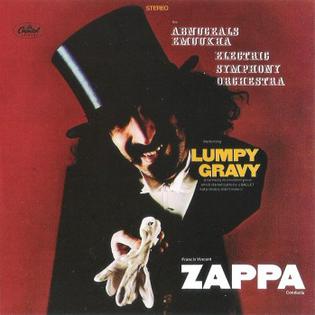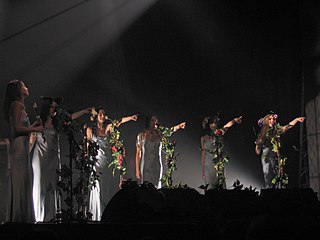
Coldcut are an English electronic music duo composed of Matt Black and Jonathan More. Credited as pioneers for pop sampling in the 1980s, Coldcut are also considered the first stars of UK electronic dance music due to their innovative style, which featured cut-up samples of hip-hop, soul, funk, spoken word and various other types of music, as well as video and multimedia. According to Spin, "in '87 Coldcut pioneered the British fad for 'DJ records'".

The Chemical Brothers is an English electronic music duo formed by Tom Rowlands and Ed Simons in Manchester in 1989. They were pioneers in bringing the big beat genre to the forefront of pop culture. After attracting Virgin Records, the duo achieved further success with the second album Dig Your Own Hole (1997), which topped the UK charts. In the UK, they have had six No. 1 albums and 13 top-20 singles, including two chart-toppers.

The Space Ritual Alive in Liverpool and London is a 1973 live double album recorded in 1972 by UK rock band Hawkwind. It is their fourth album, reached number 9 in the UK Albums Chart and briefly dented the Billboard Hot 200, peaking at number 179.

Orbital are an English electronic music duo from Otford, Kent, England, consisting of brothers Phil and Paul Hartnoll. The band's name is taken from Greater London's orbital motorway, the M25, which was central to the early rave scene during the early days of acid house. Additionally, the cover art on three of their albums showcase stylised atomic orbitals. Orbital have been critically and commercially successful, known particularly for their live improvisation during shows. They were initially influenced by early electro and punk rock.

Power, Corruption & Lies is the second studio album by English rock band New Order, released on 2 May 1983 by Factory Records. The album features more electronic tracks than their 1981 debut Movement, with heavier use of synthesisers. The album was met with widespread acclaim, and has been included in music industry lists of the greatest albums of the 1980s and of all time. The cover artwork was by Peter Saville, and in 2010 it was one of ten classic album covers from British artists commemorated on a UK postage stamp issued by the Royal Mail.
William Mark Wainwright, known professionally as William Orbit, is an English musician and record producer who has sold 200 million recordings worldwide of his own work, his production and song-writing work. He is a recipient of multiple Grammy Awards, Ivor Novello Awards and other music industry awards.
Fluke was an English electronic music group formed in the late 1980s by Mike Bryant, Jon Fugler and Mike Tournier. The band were noted for their diverse range of electronic styles, including house, techno, ambient, big beat and downtempo; for their reclusivity, rarely giving interviews; and for lengthy timespans between albums.

Lumpy Gravy is the debut solo album by Frank Zappa, written by Zappa and performed by a group of session players he dubbed the Abnuceals Emuukha Electric Symphony Orchestra. Zappa conducted the orchestra but did not perform on the album. It is his third album overall: his previous releases had been under the name of his group, the Mothers of Invention.

Pavane pour une infante défunte is a work for solo piano by Maurice Ravel, written in 1899 while the French composer was studying at the Conservatoire de Paris under Gabriel Fauré. Ravel published an orchestral version in 1910 using two flutes, an oboe, two clarinets, two bassoons, two horns, harp, and strings.

E-Z Listening Disc is a compilation album by the American new wave band Devo, originally released in 1987 by Rykodisc. The album is a compilation of all but one of the tracks from Devo's two E-Z Listening Muzak Cassettes, which had been available only through Club Devo in 1981 and 1984, respectively, consisting of instrumental versions of Devo songs performed in the style of easy listening Muzak or New-age music.

Orbital is the debut studio album by English electronic music duo Orbital, released on 30 September 1991 by FFRR Records. Orbital self-titled their first two albums so the "Green Album" is an unofficial name to distinguish it from the second album. The Mutations EP refers to the album as L.P. C.D. M.C., thus titling the album after the "LP" / "CD" / "MC" on the front cover of the respective format.

In Sides is the fourth album by British electronic group Orbital, released in the UK on Internal on 29 April 1996. The album's title is a reference to the fact that the original vinyl LP release of the album was as a 3-LP vinyl box set, with one track per side of each disc. In Sides saw the band continue the process, begun on their previous album Snivilisation, of moving away from making music for the rave scene towards more intricately crafted melodies and reflective, downtempo tracks. Gathering widespread acclaim not just from dance music magazines but also the UK's more traditional rock music papers such as NME and Melody Maker, the album is considered by many reviewers and fans to be among Orbital's best work.

Pieces in a Modern Style is the sixth album by electronic instrumentalist William Orbit. He is credited as arranger, programmer, producer, and performer of the album. It was released in 2000 by WEA and Warner Music UK in Europe and Maverick Records in the United States. Barber's Adagio for Strings was the first single from the album; however, the version played on radio and television was a remix by Ferry Corsten. The album is a fusion of classical music, electronica, ambient music and chill out music and contains no vocals. The Adagio single reached #4 in the UK Singles Chart in December 1999.

"Chime" is the first single from the British electronic group Orbital. It was originally recorded on cassette tape and allegedly cost less than £1 to produce. The track was originally released in December 1989 and was a big underground success. In 1990, it had a wider release on FFRR Records, and reached number 17 on the UK Singles Chart.

History of Modern is the eleventh studio album by English electronic band Orchestral Manoeuvres in the Dark (OMD), released on 20 September 2010 by 100% Records. It is their first album since 1996, and the first to feature the classic four-piece OMD line-up since 1986's The Pacific Age. It was recorded remotely, with band members compiling the tracks via the Internet.
The music of the video game Final Fantasy XIII was composed by Masashi Hamauzu. Former regular series composer Nobuo Uematsu did not contribute any pieces to the soundtrack. Music from the game has been released in several albums. The main soundtrack album, Final Fantasy XIII Original Soundtrack, was released on four Compact Discs in 2010 by Square Enix, the developers and producers of the game. Selections from the soundtrack have been released on two gramophone record albums, W/F: Music from Final Fantasy XIII and W/F: Music from Final Fantasy XIII Gentle Reveries, both in 2010 by Square Enix. An album of arranged pieces from the soundtrack, Final Fantasy XIII Original Soundtrack -PLUS-, was also released by Square Enix in 2010, as was an album of piano arrangements, Piano Collection Final Fantasy XIII. The theme song for the Japanese version of the game, "Kimi ga Iru Kara", was released as a single by For Life Music in 2009.

"Crosscut Saw", or "Cross Cut Saw Blues" as it was first called, is a hokum-style song "that must have belonged to the general repertoire of the Delta blues". Mississippi bluesman Tommy McClennan's recording of the song was released in 1941 and has since been interpreted by many blues artists. "Crosscut Saw" became an early R&B chart hit for Albert King, "who made it one of the necessary pieces of modern blues".

The Mediæval Bæbes are a British musical ensemble founded in 1996 by Dorothy Carter and Katharine Blake. It included some of Blake's colleagues from the band Miranda Sex Garden, as well as other friends who shared her love of medieval music. The lineup often rotates from album to album, and ranges from six to twelve members. As of 2010, the group had sold some 500,000 records worldwide, their most successful being Worldes Blysse with 250,000 copies purchased.

The Other Side of Me is the thirty-fifth studio album by American pop singer Andy Williams, released in the summer of 1975 by Columbia Records and including the 1973 recording of "Solitaire" from his album of the same name alongside 10 original recordings, four of which were also by "Solitaire" composer Neil Sedaka. After unsuccessful attempts to leave behind the formulaic album genre of easy listening covers of pop hits, The Other Side of Me offered a compromise by filling half of the sides with material that was popularized by other artists and the other half with either new or obscure selections.
Final Fantasy XIII-2 is a role-playing video game developed and published by Square Enix in 2011 as the sequel to Final Fantasy XIII. The music of the game was composed by Masashi Hamauzu, Naoshi Mizuta, and Mitsuto Suzuki. It was intended to sound different from the music of previous Final Fantasy titles, featuring more musical styles and vocal pieces. Since the release of the game, Square Enix has published the 2011 four-disc soundtrack album, Final Fantasy XIII-2 Original Soundtrack, as well as an album of arrangements and alternate versions of tracks from the game, Final Fantasy XIII Original Soundtrack PLUS, in 2012. The theme song for the game, "Yakusoku no Basho", was released by singer Mai Fukui as a single in 2011, and the English version of the song, sung by Charice Pempengco and included in the non-Japanese versions of the game, was included on her 2012 album Infinity.
















